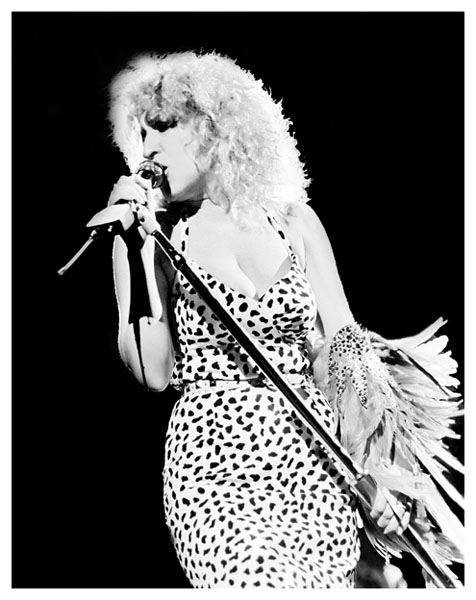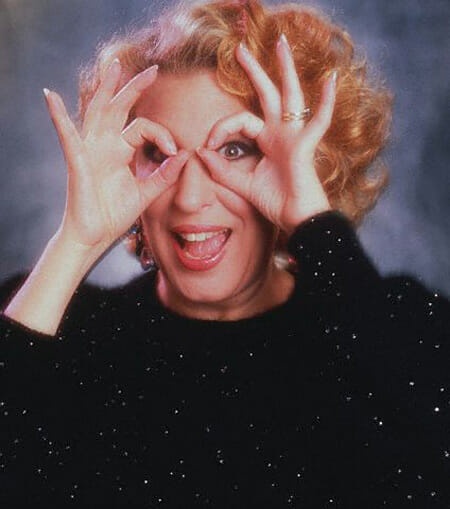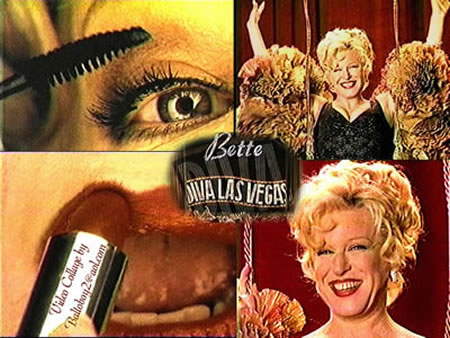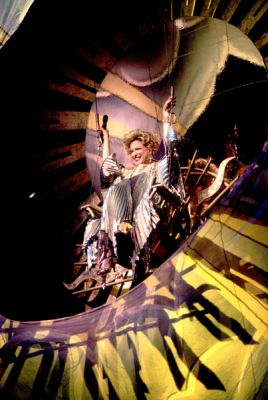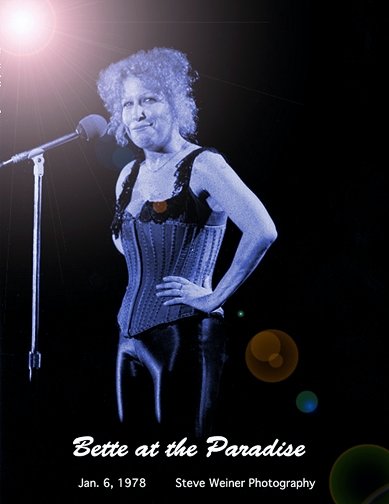A Little Night Music With Bette
By Jerry Adler | NEWSWEEK
From the magazine issue dated Sep 27, 1993
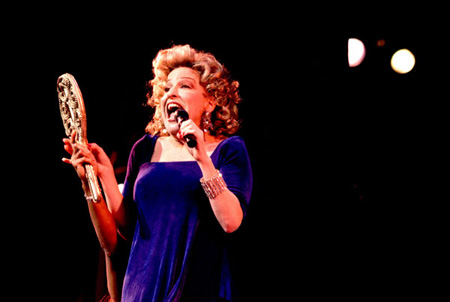
IN 1964, SUSAN SONTAG, WHOSE IDEAS ARE ESSENTIAL FOR appreciating the intellectual context of Radio City Music Hall, described camp as “a private code among small urban cliques”–NYU grad students, for instance, crowding the revival houses to laugh themselves silly over “Dark Victory.” What Sontag could not have foreseen was how that elite sensibility would someday sweep the nation. just a few years later a young Honolulu-born chanteuse named Bette Midler would wow the connoisseurs of outrageousness at New York’s gay bathhouses. And now, a decade since her last tour, she’s back on stage, leading a chorus line of mermaids in motorized wheelchairs flipping their tails to “New York, New York.” Last month she played Washington–the city that, with the collapse of the Soviet Union, is virtually the last bastion of literal-mindedness left in the world. Last week she opened in New York, and by the time her “Experience the Divine” tour leaves on Oct. 23, the cognoscenti who are in on the joke will have filled the 5,874 seats of Radio City 30 times over (the longest stretch of sold-out shows in Radio City history)–and then headed home, happily buckled into their Volvos, to the sophisticated precincts of Long Island, New Jersey, or, in my case, Brooklyn.
Her show, like her whole career, is a triumph of attitude. “Show business,” she says, “is all well and good but you can’t take it too seriously.” I liked it that one of the four chorus girls who herald her appearance with a blast of angelic trumpets comes on stage conspicuously chewing gum, faintest of tummy poking out over the waistband of her spangled diaphanous pants. Midler’s backup singers have been reconstituted as the “politically correct Harlettes,” living proof that no race has a monopoly on tackiness. I liked seeing Midler, who is now 47 and the mother of a 6-year-old girl, prancing like a go-go girl in an electric-blue outfit that even when she stood still shimmered against the background of a violently fuchsia-tinged scrim. I liked hearing her bray burlesque jokes that were old when she first picked up a ukulele in junior high school. (She has a gift for making even contemporary material sound as if it were lifted from Fanny Brice: sex-starved, picks a hunk to carry her groceries, grabs him in parking lot and says, “I have an itchy booty.” “Lady,” he says, “all those Japanese cars look the same to me.”) But mostly, I liked the idea that she did all these things and then came out alone on stage to sing “The Rose” and “From a Distance.” Great singers can command an audience with their voices alone; Midler knows it’s a good idea to get the people on her side first.
I was interested to see, though, that the desperate hunger to be loved that drives so many performers has begun to wane in her just a little. She wants to show the audience a good time, but she’s not asking for a commitment. Take the wheelchairs. To me, they were a shameless ploy for sympathy, subliminally signaling vulnerability and pathos, even though moments before she had hurled herself across the stage for the fifteenth chorus of “Delta Dawn.” But, no: the wheelchairs were there, she explained, because how else are you going to strut across the stage in sequined flippers? The flippers were the trademark of “Delores De Lago, the toast of Chicago”–a bitter and angry mermaid, haranguing us with her “Twelve Stroke Program,” the only principle of which I recall was, “Put down the Pringle’s and pick up the porta-phone.” Midler created Delores for a tour back in 1978 so she could get away with singing anything she wanted–a medley from “Oklahoma,” for example. “A regular human being, they’d boot you off the stage if you sang some of this junk…but I happen to love it.”
Of course, it makes no sense, but why should it? Camp, in its assertion that something can be so bad it is actually good, began the job of subverting sense in Western culture; Midler would be happy to finish it. Her genius is for the non sequitur, which is why she’s happy to have stopped making movies for a while. Nine movies in eight years have filled her with a burning desire to get up on the stage and fool around instead. Her husband, Martin von Haselberg, a German-born businessman performance artist and aspiring director, wants her to develop a Mae West-like screen persona that can carry her for the next decade of movie work. But Midler is resisting it. “I’m evolving into something,” she admits, “but I’m not sure what it is … and I have no control over it.” She doesn’t even want to direct. “My thing is all sendup,” she says. “I don’t have a story I want to tell, and the stories I do have are the ones nobody wants to hear anyway. And they’re right. There are eight million stories in the naked city and most of them shouldn’t be heard.”
As a journalist, I’ve always suspected as much. How refreshing it is to hear someone say it. It’s of a piece with her observation that if the Clinton health plan lets people choose their own doctors, she already has one in mind: Dr. Kevorkian. “Camp,” Sontag wrote, “asserts that good taste is not simply good taste; that there exists, indeed, a kind of good taste of bad taste.” How much do we owe Bette Midler for making the world safe for bad taste?
Find this article at
http://www.newsweek.com/id/115560


